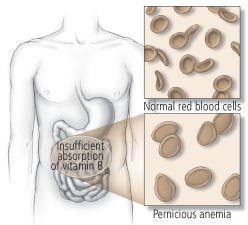Pernicious anemia (also known as Biermer’s anemia, Addison’s anemia, or Addison-Biermer anemia) is a form of megaloblastic anemia which occurs due to a vitamin B12 deficiency. It is most often caused by impaired absorption of vitamin B12 in the GI tract due to the absence of intrinsic factor in the setting of atrophic gastritis, and more specifically of loss of gastric parietal cells. Future posts will fully describe and explain exactly the functions of these processes.

The name of the disease comes from the historical fact that early sufferers were always properly diagnosed after they were classified as anemic (had low blood hemoglobin levels). However, with more modern tests which specifically target B12 absorption, the disease may properly be diagnosed before patients actually become anemic. An individual with this illness will have to supplement his/her B-12 for the rest of their lives or risk the onslaught of extremely unpleasant symptoms. Most commonly the cause for impaired binding of vitamin B12 by intrinsic factor is autoimmune atrophic gastritis, in which the person’s own antibodies are directed against certain cells, resulting in their death, as well as against the intrinsic factor itself, rendering it unable to bind vitamin B-12.
Sometimes the loss of the GI cells may simply due to a weakening digestive system, such as that frequently occurring in elderly people affected and Helicobacter pylori infection. Note that forms of vitamin B12 deficiency other than pernicious anemia must be considered as a B12 deficiency can cause megaloblastic anemia, which is easily mistaken for classical pernicious anemia, The deficiency may also be caused by infection with a tapeworm, possibly due to the parasite’s competition for vitamin B12
The treatment of Pernicious Anemia varies from country to country and from area to area, but there is yet no cure. Cobalamin (one of the forms of B-12) is usually injected and is given every month in some countries and every three months in others. The single most common cause of complaint by members of the Pernicious Anemia Society is that patients needs vary and some patients need more frequent injections than others.
Patients who are needle-phobic, or patients who are unable to receive injections for another reason can be prescribed cyanocobalmin tablets in very high doses, which means that some of the B12 is absorbed in other places in the bowel other than the terminal ileum where B12 absorption usually takes place. The efficacy of using B12 tablets to treat pernicious anemia (by definition due to atrophic gastritis) is likely not to be sufficient, as the body will have trouble absorbing it as it does from food.

